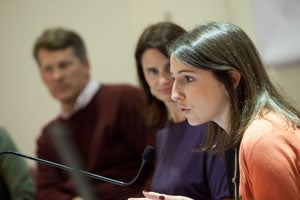The Harvard Food Law Society recently co-sponsored a forum on food policy at the law school. “TEDxHarvardLaw,” a full-day conference held on Oct. 21, focused on food policy and public health, and the legal and policy approaches to increasing the supply and demand of healthy foods. The campus-wide event was co-sponsored by 18 different HLS organizations and Technology, Entertainment, and Design (TED), a nonprofit focused on spreading ideas through conferences that can be viewed online for free.
Dr. Robert Lustig, professor of pediatric endocrinology at the University of California, San Francisco, kicked off the event the night before, with a lecture on “The Sugar Epidemic: Policy vs. Politics.” In his talk, Lustig argued for a paradigm shift in the public policy approach to obesity.
Emily Broad Leib of the Harvard Health Law and Policy Clinic gave a presentation on “Lawyers and the Food Movement.” Among the other speakers were Walter Willet, head of the department of nutrition, Harvard School of Public Health, who discussed how modern dietary patterns lead to disease; Susan Prolman, executive director, National Sustainable Agriculture Coalition, who focused on the 2012 Farm Bill and Doug Rauch, former president of Trader Joe’s.
The Harvard Food Law Society, which seeks to highlight law, policy, science and management issues that confront professionals in the fields of food law and food policy, has organized a number of events this year at the law school, including a talk with New York Times writer Gary Taubes on “Why we get fat: Adiposity 101 and the Alternative Hypothesis of Obesity,”. Early this month, Larry Soler, who heads The Partnership for a Healthier America, an organization devoted to working with the private sector to ensure the health of our nation’s youth by solving the childhood obesity crisis, spoke at the law school.
Read coverage of the TEDxHarvardLaw conference in the Harvard Crimson. The Oct. 24 article, “HLS Discusses Food Policy at a Conference Highlighting Healthy Eating, Agriculture Law, and Hunger,” by Daniel J. Kramer, is excerpted below.
“The Food Law Society at Harvard Law School hosted a conference Friday on United States food policy, discussing healthy diets, federal agricultural laws, hunger, and how to encourage healthy eating. The conference highlighted the need to increase access to cheap, healthy food and to rebrand healthy food as something with mass appeal.
Most of the conference was centered on the legal and economic issues associated with food. Doug Rauch, former president of Trader Joe’s Co. who helped turn the California chain into a national success, spoke on what he called “the U.S. hunger paradox”—the idea that we have more food, more cheaply than any nation in history, but more people are going hungry.
Rauch went on to explain that on the supply side, we have so much food that people who can afford to buy can afford to waste; it’s so cheap that many people throw good food out unconcerned. On the demand side, Rauch said, those afflicted by poverty cannot afford food containing essential nutrients, leading to malnutrition, and can only afford cheap food with empty calories, leading to obesity.”
Read full Harvard Crimson article here.
